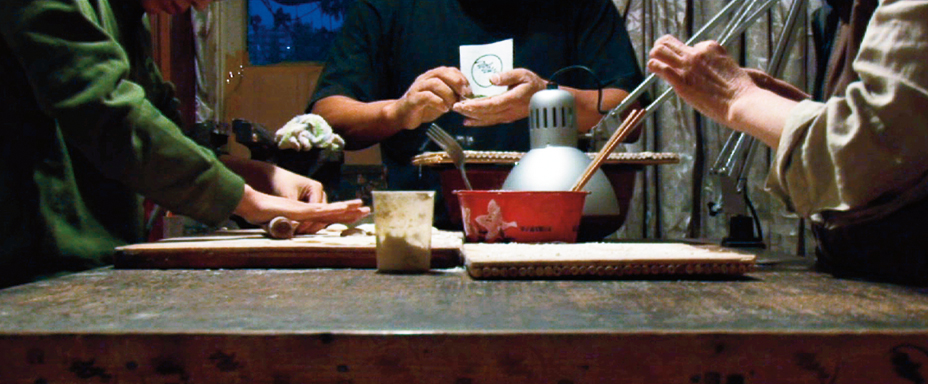By Andrew Hamlin
NORTHWEST ASIAN WEEKLY

![]()
![]()
![]()
![]()
A man finishes his work for the day. His wife and his daughter join him. They make dinner.
And that, objectively, is about all that occurs during Jiayin Liu’s second feature film, “Oxhide II.” Over 132 minutes, we watch the family, as the evening meal progresses from scratch ingredients and groceries brought home, to shaping small dumplings, planting meat-and-chives filling inside the dumplings, cooking the dumplings in a wok, clearing the table, and sitting down to eat.
Sounds boring? Guess again. Because dinner and its preparation are all Jiayan Liu needs to show mastery on several fronts at once. “Oxhide II” works as a portrait of her family. It works as a portrait of a certain segment of modern Chinese life. It works as transcendence, because in its intense focus on a seemingly-simple task, it shows the task to have an inner life of its own. The Liu family brings the task to life, but they don’t quite control it, physically or metaphysically. They shape it, as they shape the dumplings, but beyond a certain point, the task begins to shape them as well.
Liu was born in Beijing in 1981. She won admittance to the prestigious Beijing Film Academy, and for her graduation project, she put together the original “Oxhide” film. This was 110 minutes long, and combined elements of documentary filmmaking and dramatic, scripted film.
“Oxhide” is a portrait of Liu’s family, playing scripted versions of themselves, set in the cramped Beijing apartment that the director shares with Zaiping Liu, her father, and Huifen Liu, her mother. (The family cat appears in both films, but, being a cat, wanders in and out and around, to suit itself — though it’s quick to jump at edible tidbits.)
Zaiping Liu works with his hands to create custom-crafted bags and other leather goods from oxhide. Business is not good. Business has not been good for some time. The family’s slow slide into financial jeopardy formed the spine of the film, but the main point was to spend time with these three people, to find out what they meant to each other, and how they expressed their feelings.
Director Liu shot “Oxhide” using only 22 different shots (a Hollywood film of similar length would typically have more than 100), and she never moved her digital camera during any one particular shot. For “Oxhide II,” featuring her family, their apartment, and the cat, once again, she sets herself an ever harder formal task. Over 132 minutes, she uses only nine shots, moving at 45-degree angles around a central point.
The family apartment is so very cramped, that moving the camera at all feels like a major revelation — just when we’ve gotten used to one vantage point, over 20 minutes or so, another one comes along to make our head spin. But the director understands what she’s doing. Working with one setting, and virtually without a budget, she finds such ways to startle, and challenge, the audience’s perceptions.
She chooses her shots carefully, but she isn’t concerned about conventional shots, or conventional storytelling.
The first thing we see is Zaiping Liu working oxhide at his worktable, which doubles as the family dining table.
We don’t know who he is, where he is, or what kind of work he’s doing. But we follow him very closely. With patience, and a little faith, we figure out what’s going on.
Some shots don’t show faces for long periods. But we don’t need to see faces to figure out personalities. The voices, when they come in, tell a story. And more than anything else in the film, the hands tell a story. Zaiping Liu has a particular way of working his materials. And the director often positions at least two pairs of hands in a single shot. We can figure out emotional states from the way two hands snap off small pieces from a larger length of dough, or pluck chives, or chop meat.
And slowly, intricately, we learn what’s going on in this family. The daughter wants to learn cooking and cooking preparation, but she’s worried that she’ll never get anything right. The mother is worried about the father. The father struggles to not show what he’s feeling. But it becomes apparent that he’s worried about all of them.
And finally, they all worry about the people working in the father’s shop — people never shown, only discussed.
But if the father’s shop goes under, the little family won’t be the only ones in serious trouble.
And nothing about the film, formally, seems surprising. The family finishes the preparation, by which point they’ve become real and even cherished to the viewer. The meal that took an hour or more to prepare is eaten in 10 or 15 minutes.
And the family leaves the room, to whatever space they have left over. We’re pretty sure it isn’t much. They’ll sleep, probably. The camera shows the table, which has become a character of its own in this up-close saga.
Perhaps Jiayin Liu can make a third film bringing this level of concentration, passion, and richness in simplicity, to their new day.
“Oxhide II” plays April 14 at Northwest Film Forum, 1515 12th Ave., Seattle. For prices, showtimes, and other information, visit nwfilmforum.org/films/home-movies-oxhide-ii-niupi-er.
Andrew can be reached at info@nwasianweekly.com.

